
For centuries chemicals have been used in almost every industry, product and application; because people didn’t understand how to use biology. Now, that’s changing…
Historically, there has been strong global reliance on chemistry, which was driven by necessity due to limited understanding of biology. The Industrial Revolution amplified this shift, as chemical processes offered scalability and immediate outcomes that biological methods could not match. These chemical solutions led to advancements, but at a considerable cost to environmental health and sustainability.
For too long, reliance on chemical processes has overshadowed the intrinsic benefits and potentials of biologicals. Today, experts with a deeper understanding of biology and its capabilities are changing the narrative.
Delve into the crucial shift towards leveraging bio-based solutions that outperform chemicals and solve key challenges in top global industries.
The Dawn of Chemistry and its Impact
The formal study of chemistry began in the 17th century, although its practices date back to ancient civilizations. This scientific field has undeniably revolutionized the way we live, from the medicines we depend on to the materials that form our everyday tools. The rise of chemical industries catalyzed unparalleled growth in manufacturing and product development; but this growth came at a cost.
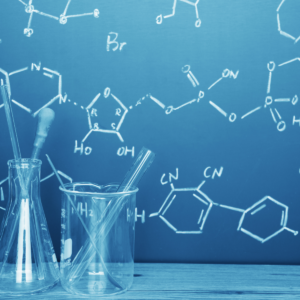
Over time, the world’s reliance on chemical processes began to show significant environmental and health impacts. The chemical industry, while driving economic growth and technological innovation, has also contributed to some of the most pressing challenges we face today.
Biology: The Original Architect of Our World
In contrast, biology— the study of living organisms and their interactions with the environment—has been quietly shaping our planet for billions of years. From the oxygen we breathe, produced by plants through photosynthesis, to the natural cycles that recycle nutrients, biology is the ultimate engineer of life.
The history of biology as a science might not be as linear or as documented as that of chemistry, but its impact is far reaching.
There is an estimated one trillion microbial strains on Earth. These microorganisms are capable of producing a wide range of bio-based ingredients that offer sustainable alternatives to chemicals.
Microorganisms were often overlooked in the past, but have now emerged as powerful agents of change. They have an unmatched ability to metabolize organic matter and perform complex biochemical reactions.
The understanding of biological processes has led to advancements in agriculture, energy, medicine, personal care and environmental conservation. The potential for biology to sustainably revolutionize industrial applications is vast, yet remains largely untapped. 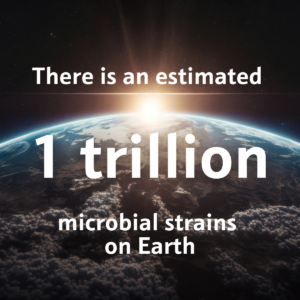
Chemistry and the Industrial Revolution
The dawn of the Industrial Revolution marked a significant departure from biological processes in favor of chemical solutions. This shift was largely driven by the era’s limited understanding of biologicals and the immediate, scalable benefits that chemical processes promised.
The Industrial Revolution is known for its unprecedented advancements in science and technology. Central to this era of transformation was the rise of chemistry. People marveled at the ability to create new substances and materials quicker and more cost-effectively. From textiles to transportation, chemicals seemed to hold the key to a prosperous future.
However, as time went on, a darker side of chemistry arose. The same substances that promised progress began to reveal harmful effects on the environment and human health. Pollution, environmental degradation and health hazards emerged as unintended consequences.
Environmental awareness is now taking center stage; and investors and companies alike are in pursuit of sustainable alternatives. The spotlight is on the shift from chemical to biological solutions. They promise not only to redefine industrial processes, but also to mitigate the longstanding environmental impacts of traditional manufacturing practices.
The Case for Biological Solutions
The environmental impact of chemical ingredients is well-documented. Their production and disposal has contributed to pollution, ecosystem degradation and even climate change. Biological ingredients, on the other hand, boast a significantly lower environmental footprint, degrading into harmless byproducts and requiring less energy for production. The transition to biology-based ingredients is not just an environmental necessity but a strategic move towards sustainable industry practices. 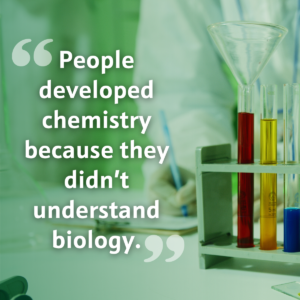
The environmental imperative for this shift cannot be overstated. Concern regarding the potential adverse effects of chemical pollutants on ecosystems and human health in increasing. Transitioning to bio-based solutions is not merely beneficial but necessary for addressing these challenges and ensuring a sustainable future.
The world is standing at the cusp of a transformative shift—from the complex world of chemistry to the foundational principles of biology. It’s a journey back to the basics, where biology can not only complement but also enhance and sustain all facets of our industries.
Recent Advancements in Biotechnology
As scientists and innovators turn their attention back to biology, they’ve discovered that tiny microorganisms, while invisible to the naked eye, hold immense potential to solve some of our most pressing issues. Now, advances in biotechnology have unlocked an even deeper understanding of biologicals and their remarkable capabilities.
Nature, with its billions of years of evolution, offers sophisticated solutions for many of the challenges we face today. From the remediation of pollutants to the creation of sustainable consumer products, the applications of biological ingredients are immense. This realization and newfound understanding has prompted a significant shift from chemically driven processes to biological ones.
At the forefront of this transformative change is Locus Fermentation Solutions (Locus FS); a pioneer in biotechnology and master in leveraging the power of biology.
Locus Fermentation Solutions: Better with Biology 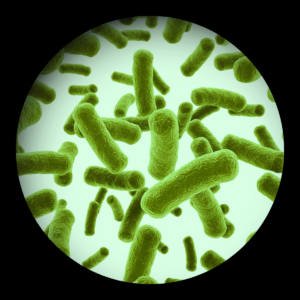
Locus Fermentation Solutions is the leading supplier of biological solutions that can outperform chemicals in safety, sustainability and performance. The bio-based ingredients make key sectors better with biology, including:
Through years of extensive research and innovation, experts at Locus FS perfected the art of utilizing microorganisms and a patented fermentation process to develop biosurfactants, microbes, enzymes and other biologically derived materials. These 100% bio-based ingredients are customized to improve productivity, reduce carbon footprints and solve challenges for industries around the world.
From soil amendments to consumer products, Locus FS and its operating divisions offer sustainable alternatives to traditional chemicals that drive profitable results and promote a sustainable and circular economy.
Locus FS’ innovations demonstrate that biologicals can not only match but often far surpass the efficacy and efficiency of traditional chemicals. The work signifies a clear move towards leveraging biology for sustainable, effective and eco-friendly alternatives. The company’s mission to replace chemistry with biology is more than a scientific endeavor; it’s a commitment to a sustainable and thriving future.
Embracing a Biological Future
Today, the choice between chemistry and biology has never been clearer. The transition to biological solutions can mitigate the negative impacts of chemicals and build a future where innovation coexists with sustainability. Companies like Locus Fermentation Solutions are leading the charge, demonstrating the benefits of going back to the basics of biology.
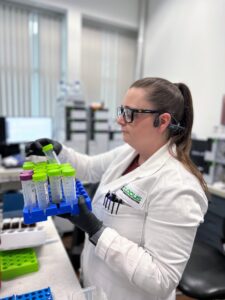
Thanks to the experts at Locus, the abilities of biologicals have become increasingly clear. Bio-based ingredients have incredible potential to make industries better, cleaner and more sustainable. By integrating bio-based ingredients, industries can reduce their environmental footprint, enhance the safety of their products and contribute to a healthier planet. This shift also aligns with growing consumer demand for eco-conscious products, positioning companies at the forefront of sustainability.
It’s clear that biology holds the key to a greener, more sustainable future. By choosing biology over chemistry, we can address ecological challenges and create industrial processes where nature and technology work hand in hand.
Join Locus in this journey to make the world better with biology.
Questions? Contact Us.